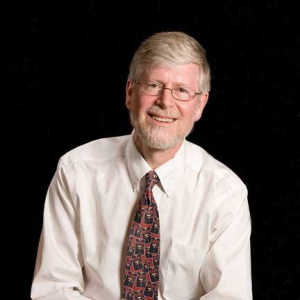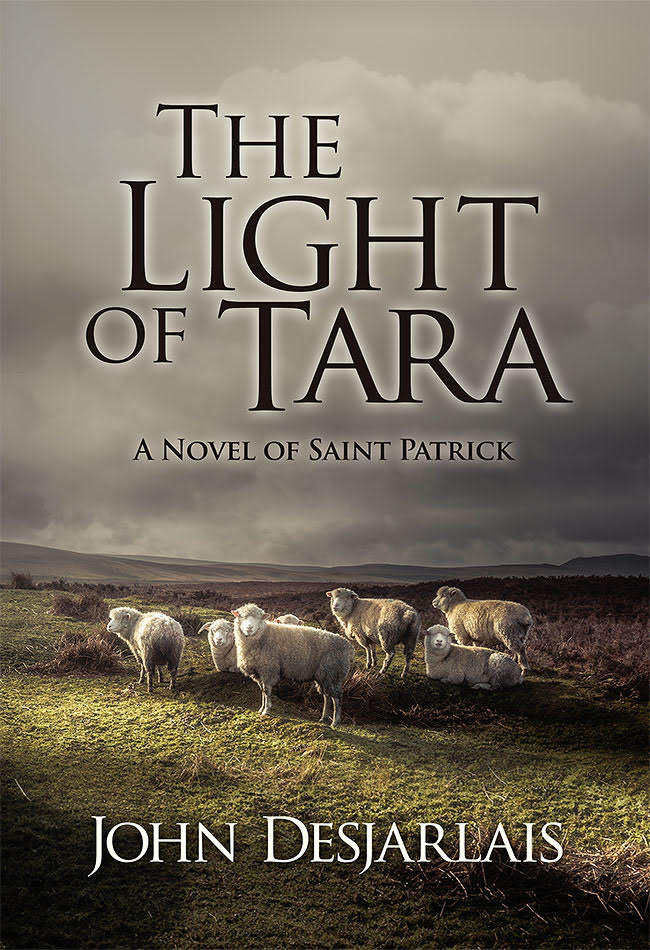I was recently delighted to receive an email from John Desjarlais, a fellow writer and lover of saints. He just finished his seventh novel, about St. Patrick, and I’m watching my mailbox daily so I can start reading it as soon as it arrives here. While I wait, I’ve had fun chatting with John about saints and writing and thought you’d enjoy getting to know him too. And if you haven’t got any other plans for St. Patrick’s Day this year, grab a copy of The Light of Tara and celebrate with a good read!

TKM: Tell us a bit about John Desjarlais!
John: I’m a Catholic husband, father and grandfather recently retired from college teaching. I’ve been writing since I was a kid. The first story I remember was about my dog who gave away a cherished Christmas present (a bone) to a stray. Another early story was about Santa Claus needing a new suit, so when he settled on a blue one and his reindeer didn’t recognize him, they kicked him off the sleigh, supposing he was an imposter. Last year I polished it and gave it to my granddaughters as a Christmas present.
TKM: Tell us a bit about your latest novel.
John Desjarlais: The Light of Tara retells the adventurous true story of Saint Patrick, who is kidnapped from his villa in Britain as a teenager by Irish pirates and enslaved in a place far from Roman civilization. On a lonely mountain tending sheep and swine, he reclaims the faith he spurned, learns the Irish language and lore from his master’s son, and falls for the feisty daughter—prompting the murderous jealousy of the druid-master’s apprentice.
He escapes, and after a harrowing journey, makes it home. But he is troubled by a recurring dream: the plea of the Irish to come back. To do so, he must overcome a suspicious church, a backstabbing mentor, and the vow of his former rival to kill him if he returns.
TKM: How did you decide whose point of view to tell this story from?
John: I wrote in third person multiple, I guess you call it, since I needed to be in many locations where the main character (Patrick) was not present. Even in some scenes where he is present, I needed the perspective of others about him. I’ve used the same approach in my other historical novels, The Throne of Tara: A Novel of St. Columba, and Relics, a medieval thriller. Historical novels tend to have large casts and many settings.
TKM: Is your main character at all like you?
John Desjarlais: Not at all. St. Patrick is a risk-taker, a persevering planner, courageous, determined in the face of danger, driven by faith. He is certainly no quiet academic; in fact, he calls himself an “ignoramus” in his memoirs. He’s a man of action, initiative, and daring.
TKM: Who is your favourite author and why?
John: Oh, my. Who has only one? [TKM: not me!] I’ve admired C. S. Lewis since I became serious about my faith in college. His baptized imagination awakened a sense of wonder in me, and his creative explanation and defense of the faith deepened my confidence. In later midlife I “befriended” Thomas Merton, whose sharp intellect and soulful yearning for a direct experience God guided me at a time when I was seeking a more contemplative and sacramental life.
TKM: What was the most challenging part of writing a novel, and how did you overcome that challenge?
John: The Light of Tara is my 7th book, and each one has a particular challenge: getting the research right, fully realizing and motivating characters, and other aspects of writing craft.
The most challenging aspect for any novel is simply to finish it. A half-finished book is no book at all. One must put one’s seat in the seat and do the work. The only way to address this challenge is to swing one’s legs out of bed and go to the desk regularly. Just an hour a day gives you 7 hours a week. Two hours gives you 14, a part-time job. Set a timer. It helps to set intermediate goals of word count or page numbers or calendar deadlines. A page a day is pretty good. At the end of a year, given rest breaks and sick days, you’ll have about 350 pages.
TKM: What was the most fun or most exciting part of writing a novel?
John Desjarlais: Typing “The End.” Just kidding. It’s seeing your characters come to life. They become more real than the people you know. I’d be at dinner and my wife would snap her fingers and say, “You’re thinking about NAME again, aren’t you?” And I’d “awaken.” A novel is, after all, a vivid and sustained dream, and you often find yourself daydreaming about it.
TKM: What inspired you to write historical fiction?
John: Writers can be inspired by a time, a setting or a character. For me, it was all three.
 I had written The Throne of Tara: A Novel of Saint Columba in 1990, after scripting and producing a documentary about Church history. I became fascinated by Irish monasticism and Celtic spirituality, by the monks’ love of scholarship, prayer, and poetry, and by their ardent evangelization. Soon after The Throne of Tara was published, I wondered if a “prequel” of sorts, a book about St. Patrick, might be a natural follow-up. After all, I’d already done a lot of research into the general period and the culture. I turned to contemporary mysteries instead, but I saved my notes.
I had written The Throne of Tara: A Novel of Saint Columba in 1990, after scripting and producing a documentary about Church history. I became fascinated by Irish monasticism and Celtic spirituality, by the monks’ love of scholarship, prayer, and poetry, and by their ardent evangelization. Soon after The Throne of Tara was published, I wondered if a “prequel” of sorts, a book about St. Patrick, might be a natural follow-up. After all, I’d already done a lot of research into the general period and the culture. I turned to contemporary mysteries instead, but I saved my notes.
Nearly 25 years later, I picked it up again. I wanted people to know St. Patrick’s Day was more than beer, corned beef ’n’ cabbage, a green river in Chicago and a parade in New York to celebrate Irish identity. The historical St. Patrick was a revolutionary figure. Against tremendous odds, he persevered in faith to bring God’s message of forgiveness to his former captors.
This was a time in Church history when such evangelization across cultural lines—certainly outside the Roman Empire—was not really known. The Church was preoccupied with combating heresies and with managing a chaotic, crumbling Empire, as many bishops became the defacto governors of their districts while “barbarians” ravaged the land. There was little interest in evangelizing the so-called barbarians when bishops were more busy ransoming Christian captives from them.
St. Patrick’s daring and determination were inspiring, and more so, his long obedience to an insistent call—against his better judgment—to return to the people who brutally enslaved him in order to bring them the gospel of true freedom. Another person might have hated them for that bitter bondage. But he loved them [just as St. Isaac Jogues loved his Iroquois captors]. He knew their language and their lore, which he realized pointed to Christ. One of their great heroes, Cuchulainn, was bound to a post with a hawthorn crown and was lanced in his side while being mocked by pagan priests. Who does that sound like?
Historical fiction can be escapist by transporting readers to a distant time and place in an entertaining way (and even provide some knowledge). But it can also engage readers to think about the present time, and to see how people in the past met similar challenges. Patrick’s bold willpower—and submission to God’s will—advanced the light of the Faith and preserved the lamp of learning at a time when barbarians burned the libraries of Europe and plunged the continent into a Dark Age.
TKM: What advice would you give to a writer just starting out?
John Desjarlais: Read, read, read. Read everything. Pay attention to how writers do it. And write, write, write, even if it’s awful. It’s like learning an instrument. At first you squawk a lot and make discouraging mistakes, but eventually, if you persist, you’ll make real music.
There’s no substitute for this. Reading about writing isn’t writing. Talking about writing isn’t writing. Watching YouTube tutorials or listening to podcasts about writing isn’t writing. Writing is writing.
Now, having said that, it’s useful to learn from others. I’ve found the trade magazines The Writer and Writer’s Digest valuable to study about both the craft and the business of publishing. [TKM: I once had subscriptions to both of those too!]
TKM: Where is your favourite place to write?
 John: I have a book-lined office with a roll-top desk and a mountain view. It’s idyllic. But in my previous house, for 25 years, my office was a small basement room with a narrow window that looked out to the driveway and trash cans. Not idyllic. But there was nothing to distract me.
John: I have a book-lined office with a roll-top desk and a mountain view. It’s idyllic. But in my previous house, for 25 years, my office was a small basement room with a narrow window that looked out to the driveway and trash cans. Not idyllic. But there was nothing to distract me.
TKM: Who is your favourite saint and why?
John: Oh, my. Who has only one? [TKM: not me!] I should say St. Patrick or St. Columba since I wrote books about them, right? Maybe it’s St. Mark, the gospel writer. He produced a unique and exquisite work of literary art after discovering that missionary work didn’t quite suit him.
TKM: Do you have another novel in the works?
John Desjarlais: Yes, there are two. One is nearly finished: a police procedural set in rural Illinois (I’ve written three other mysteries). The other, just begun, is a young adult space-time fantasy. I have my two “tween” granddaughters in mind as I prepare it.
More about John Desjarlais
A former producer with Wisconsin Public Radio and retired professor of journalism and English, John Desjarlais writes historical novels and contemporary mysteries. His first novel, The Throne of Tara: A Novel of Saint Columba, was a Christianity Today Readers Choice Award nominee, and his medieval thriller, Relics, was a Doubleday Book Club Selection. Bleeder, Viper, and Specter constitute the “Higher Mysteries” series. Blood of the Martyrs and Other Stories collects short fiction previously published in a variety of literary journals. A member of Mystery Writers of America, the Catholic Writers Guild, and The North Carolina Writers Network, Desjarlais is listed in Who’s Who in Entertainment, Contemporary Authors, and Who’s Who Among America’s Teachers.
To find out more about John and his books, drop by his website. You can also follow him on Facebook. If you want to read any of John’s novels with your book club, contact him for study guides.


No Responses Yet